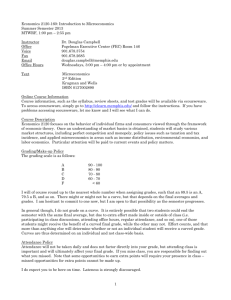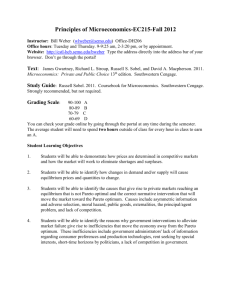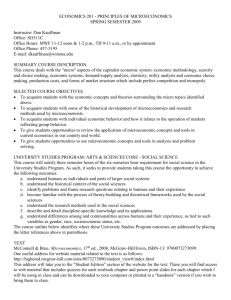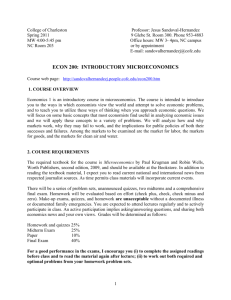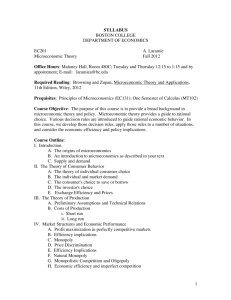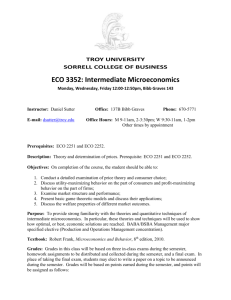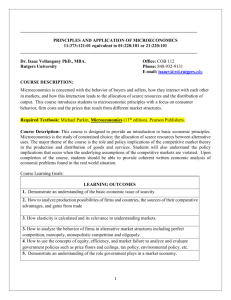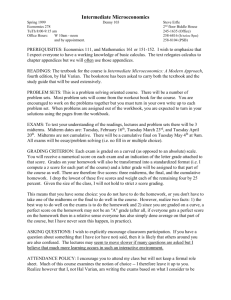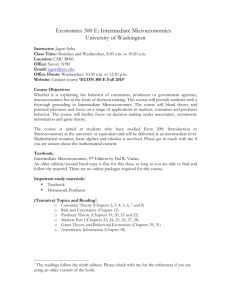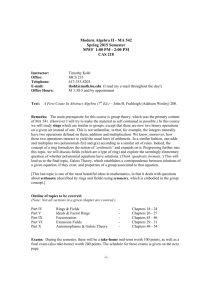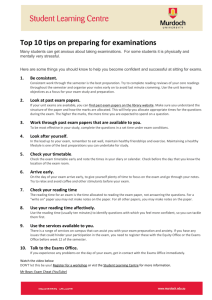Economics 101 Syllabus
advertisement
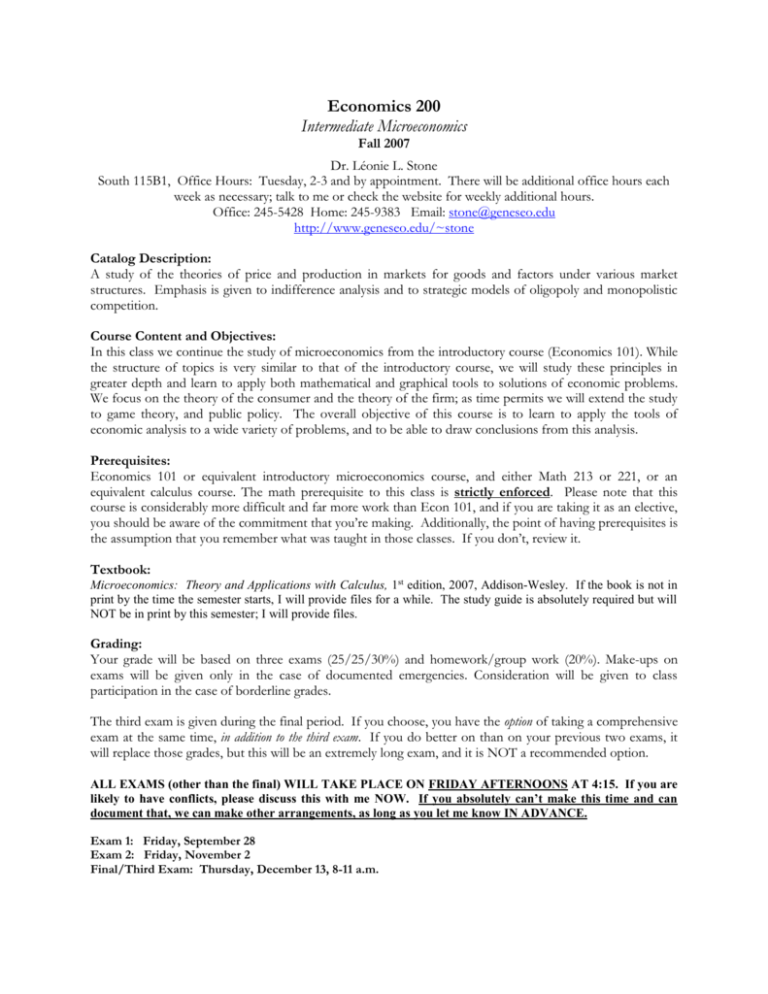
Economics 200 Intermediate Microeconomics Fall 2007 Dr. Léonie L. Stone South 115B1, Office Hours: Tuesday, 2-3 and by appointment. There will be additional office hours each week as necessary; talk to me or check the website for weekly additional hours. Office: 245-5428 Home: 245-9383 Email: stone@geneseo.edu http://www.geneseo.edu/~stone Catalog Description: A study of the theories of price and production in markets for goods and factors under various market structures. Emphasis is given to indifference analysis and to strategic models of oligopoly and monopolistic competition. Course Content and Objectives: In this class we continue the study of microeconomics from the introductory course (Economics 101). While the structure of topics is very similar to that of the introductory course, we will study these principles in greater depth and learn to apply both mathematical and graphical tools to solutions of economic problems. We focus on the theory of the consumer and the theory of the firm; as time permits we will extend the study to game theory, and public policy. The overall objective of this course is to learn to apply the tools of economic analysis to a wide variety of problems, and to be able to draw conclusions from this analysis. Prerequisites: Economics 101 or equivalent introductory microeconomics course, and either Math 213 or 221, or an equivalent calculus course. The math prerequisite to this class is strictly enforced. Please note that this course is considerably more difficult and far more work than Econ 101, and if you are taking it as an elective, you should be aware of the commitment that you’re making. Additionally, the point of having prerequisites is the assumption that you remember what was taught in those classes. If you don’t, review it. Textbook: Microeconomics: Theory and Applications with Calculus, 1st edition, 2007, Addison-Wesley. If the book is not in print by the time the semester starts, I will provide files for a while. The study guide is absolutely required but will NOT be in print by this semester; I will provide files. Grading: Your grade will be based on three exams (25/25/30%) and homework/group work (20%). Make-ups on exams will be given only in the case of documented emergencies. Consideration will be given to class participation in the case of borderline grades. The third exam is given during the final period. If you choose, you have the option of taking a comprehensive exam at the same time, in addition to the third exam. If you do better on than on your previous two exams, it will replace those grades, but this will be an extremely long exam, and it is NOT a recommended option. ALL EXAMS (other than the final) WILL TAKE PLACE ON FRIDAY AFTERNOONS AT 4:15. If you are likely to have conflicts, please discuss this with me NOW. If you absolutely can’t make this time and can document that, we can make other arrangements, as long as you let me know IN ADVANCE. Exam 1: Friday, September 28 Exam 2: Friday, November 2 Final/Third Exam: Thursday, December 13, 8-11 a.m. Homework (Problem Sets), Class Participation, Group Participation: Much of the focus of this class is on problem-solving. In order to solve problems correctly and in a timely fashion, you must practice. You are responsible for keeping up with the problems as we go along. I will not, in general, do extra problems in class; we just don’t have enough time. If you are having trouble, you are responsible for getting help, either from me or from other students. Tutoring will also be available. Please note that the function of the tutor is to help to guide you in the right direction, not to know the answer to every problem or to do the problems for you. After you return the questionnaire distributed on the first day, you will be assigned to a group. Your group will be responsible for two things. First, the group will turn in ONE homework assignment. Homework assignments will be distributed on Thursdays and will be due on the following Thursday; they are due at the beginning of class and will NOT be accepted late. It is strongly suggested that you work on these problems together; groups that have tried to split the assignments have done far less well in the past. Strategies for successful group work will be discussed further in class. Secondly, the group will work together on in-class problems, time permitting. You will be graded on this participation, and you cannot participate if you are not present, obviously. All members are expected to participate appropriately in their groups; you will be asked to grade your fellow group members at the end of the semester. Groups with free-riders or other problems are advised to discuss them with Dr. Stone as soon as possible. Your group grade is based on two primary components: Problem Sets (due every Thursday unless otherwise specified) and class participation. Group member evaluations at the end of the semester will also be considered in individual grades. Rules and Tips about Study Groups The most important thing that a group can do is work TOGETHER. Splitting up homework problems is not efficient from any point of view, especially if the group never goes over them together. This will also hurt you on exams, because unless you DO the problems, rather than just reading other people’s (or my) solutions, you will not know how to do them. Vote them off the island: If your group is having a problem with a member, you MUST let me know as soon as possible. Allowing free-riders doesn’t help the participating members, and ultimately it doesn’t help the other person, either. Under extreme circumstances, a group member may be voted out. If you are voted out of your group, your homework grade will depend ONLY on your own individual work. Please note that you will be asked to evaluate yourself and other group members at the end of the semester, and those scores will be part of your grade. The Weakest Link: However, unlike the game show, there is NO weakest link as long as everyone shows up and participates. Unless you can explain something to someone else so that they can understand it, you don’t really understand it. Thus everyone benefits from working with other people, whether you’re the one who knows the answer or you’re the one who is asking about it. Also, in most cases, two (or more) heads ARE better than one. Having more than one person look at a problem will catch logical errors and point out different ways of thinking about the problem. Bonus Points: Groups can earn bonus points for the following: highest weekly group score; highest exam average (for the group), lowest group variance in exam scores (that is, everyone in the group gets nearly the same exam score); exceptionally good class answers by a group member. Other bonus points may be awarded at the discretion of the professor. Course Schedule: (Exam dates are firm; material listed is tentative and subject to change… in fact, they are very likely to change!) Week 1: August 28, 30 Chapters 1, 2 Key concepts in microeconomics, supply and demand review, supply and demand with math, elasticity Week 2: September 4, 6 Chapters 2, 3 Elasticity applications, taxes, basics of consumer theory, Lagrangian method, expenditure functions Week 3: September 11, 14 Chapter 4 Consumer theory continued., income and substitution effects, compensated and ordinary demand curves. Week 4: September 18, 20 Chapter 5 Consumer welfare topics, labor supply Week 5: September 25, 27 Review, Exam 1, FRIDAY, September 28, 3:30 p.m. Week 6: October 2, 4 Chapter 6 Theory of the Firm, short-run production, long-run production, returns to scale Week 7: October 9, 11 Chapter 7 Short-run costs, long-run costs Week 8: October 16, 18 Chapter 8 Competitive firms and markets in the short run Week 9: October 23, 25 Chapter 8, continued; Competitive firms and markets in the long run Week 10: October 30, November 1 Review, Exam 2, FRIDAY, November 2, 3:30 p.m. Week 11: November 6, 8 Chapter 9 Applications of the competitive model, social welfare, taxes Week 12: November 13, 15 Chapter 10, General Equilibrium Analysis Week 13: November 20 TBA Week 14: November 27, 29 Chapters 11, 12; Monopolies, Market power, and Price discrimination Week 15: December 4, 6 Chapters 13, 14; Monopolistic Competition, Oligopolies, and Strategic Behavior Final: Thursday, December 13th , 8-11 a.m., same room (Requests to take the final at some other time must be submitted in writing no later than September 11. No later requests will be considered for reasons other than death or similar emergency. No early finals will be given for ANY reason.) Please check your schedule for any conflicts NOW!
